Healthcare centers must secure a top position in the organic search results to enhance their online visibility. They need to implement healthcare SEO marketing strategies to achieve an exceptional search engine ranking. An effective healthcare SEO keyword strategy is the most important and beneficial part of it that can help professionals find highly relevant keywords and rank for them.
The healthcare industry is extremely competitive because of the increasing utilization of digital marketing advancements. Practitioners must have a strong online presence to thrive in the ever-evolving digital world of healthcare marketing. If your healthcare business doesn’t rank for these searches, you may lose the opportunity to attract new patients and retain the existing ones. Relevant and high-intent keywords can increase the chances of your content becoming more visible in relevant search results.
Nothing can be achieved without an impactful strategy. You need an exceptional keyword strategy to find phrases that can rank your healthcare practice. Additionally, you need to strategically optimize your website and other digital assets with these keywords. Want to know how you can find these keywords that best suit your healthcare practice? Explore our comprehensive guide to keyword strategy for healthcare SEO to dominate the search results. We have also provided you with a list of the most relevant and high-intent keywords that you can utilize for your healthcare business.
What Is SEO Keyword Strategy for Healthcare?
It is one of the most beneficial SEO best practices that requires healthcare professionals to identify and strategically incorporate the terms and phrases relevant to their practice in their website and online presence. Healthcare SEO keyword strategy helps practitioners improve their practice’s online visibility and build a robust digital presence in relevant search engine results. They need to find keywords related to various medical conditions, available treatments, healthcare services, and more.
Healthcare experts can utilize various tools like SEMrush and Google Keyword Planner to find relevant keywords. Then they need to naturally add those phrases in their website content, paid advertisements, Google Business Profile, social media pages, header, and meta tags.
An experienced healthcare SEO agency can help you with its beneficial keyword research and optimization plan. Medical care providers can hire such an agency to seek their professional solutions. A strong keyword list is crucial for healthcare SEO as you cannot proceed with the other SEO best practices without thorough keyword research.
For instance, you want to rank your practice on search results. You have to make your healthcare website and online presence relevant to the common search queries of patients and other people. It will help your practice appear more often on the first page of relevant search results. Unless you find those keywords that your potential clients mostly use to search online for healthcare services and information that you provide, you won’t be able to proceed with further optimization.
Every SEO best practice is closely associated with keyword research. Your keyword list must contain those phrases that improve your practice relevancy as well as search engine rankings. Healthcare professionals can drive qualified online leads if they target these relevant medical keywords.
4 Key Benefits You Can Achieve with an Effective Healthcare SEO Keyword Strategy
Just as you get treatment care to improve your physical health, your healthcare website also needs proper optimization to improve its user experience and navigation. A healthcare keyword strategy can completely transform a medical website’s performance on relevant search results. Can every keyword drive conversions to your healthcare practice? The answer is no. High-intent keywords can drive your desired conversions but you need to identify and select those to naturally incorporate in your healthcare content.
High-intent keywords are those phrases that your potential patients search for when they are ready to seek healthcare services and schedule an appointment. When you target keywords, you can attract qualified medical leads, boost your ROI, and turn mediocre SEO campaigns into extraordinary success stories. Let’s find out what benefits the healthcare keyword strategy can offer your medical practice.
1. Make Your Healthcare Website More Relevant
Keyword-rich website content helps search engine crawlers align it with relevant search queries. For instance, you have incorporated the keyword ‘top healthcare clinic near me’ in your service page.
Your service page will appear in the search results when someone searches for the same keyword online as your service page matches the search query. Keywords increase the chances of displaying your website content to the prospects who genuinely seek the medical services you provide.
2. Drive Higher Search Engine Rankings
Keyword-rich content makes your online presence more SEO friendly and improves its search engine rankings. Search engines like Google are more likely to rank those websites that contain relevant keywords similar to common search queries. They prioritize these websites to deliver the most relevant and useful search results.
Similarly, your healthcare website can drive organic traffic to your practice if it ranks higher in relevant search results. More people will visit your website and you can achieve better patient aquisition and an overall revenue growth.
3. Showcase Your Practice’s Credibility and Reliability
The process requires you to research and incorporate healthcare keywords in your online presence and website content. It will demonstrate your healthcare expertise and niche most effectively. Do you know that you can’t achieve a strong online presence without a robust keyword strategy, no matter how valuable your medical services are?
Strategic keyword incorporation will help you showcase your healthcare practice as credible and reliable. It will eventually encourage potential patients to choose your healthcare services. Patients tend to trust a healthcare practice that appears knowledgeable on digital platforms.
4. Enhance Patient Experience through Keyword-Rich Content
An effective healthcare SEO keyword strategy significantly improves patient experience through the content. You must be thinking what is the relation between keywords and enhanced patient experience. So your healthcare content becomes more relatable and aligned with patients’ search queries when you incorporate relevant medical keywords with higher search volumes.
For example, a patient wants to search for the treatments of heart issues available in his/her location. Your content will appear on the first page of their online search results if you incorporate keywords like ‘best heart surgeon near me’, ‘best cardiologist in town’, or ‘helpful treatments for heart diseases’. Then the patient can easily get access to the content that he/she genuinely need and can benefit from it.
How to Find High-Ranking Keywords for Your Healthcare Practice?
Detailed keyword research and incorporation of those keywords into the content is the foundation of an effective SEO strategy. Medical professionals must identify the right and most beneficial keywords for their website content. Keywords with higher search volume and low competition can be beneficial for healthcare practices to rank their content, while there are also most helpful strategies.
Want to know what strategies you must implement? Let’s reveal the secret of healthcare keyword research to attract qualified website traffic and higher search engine rankings. Check out the following top 8 healthcare keyword strategies to improve the SEO of your practice.
1. Understand Your Target Audience
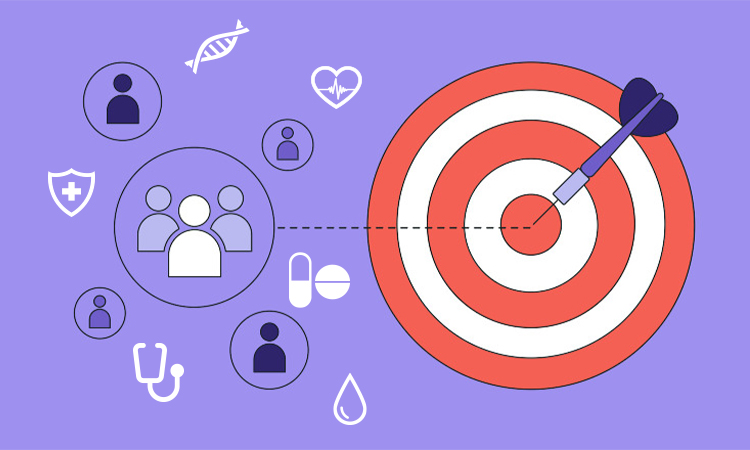
Your potential patients mostly use certain keywords to search for the healthcare content they seek. You must understand their search intent and identify those keywords so that you can incorporate them in your healthcare content. You cannot find the high-intent keywords unless you don’t understand your target audience properly.
4 Factors You Must Consider to Understand Your Target Patient Market
- What terms and phrases do the potential patients mostly use when they search healthcare information online?
- What keywords are they likely to use when they’re ready to schedule a healthcare appointment or contact a healthcare service provider?
- What healthcare information or service do they need?
- How frequently do the prospective patients use those terms to search online?
You must have a clear idea of it before you proceed with the keyword research. You can use this insight to strengthen your keyword research process and maximize its effectiveness.
2. Make a List of Broad Healthcare Topics
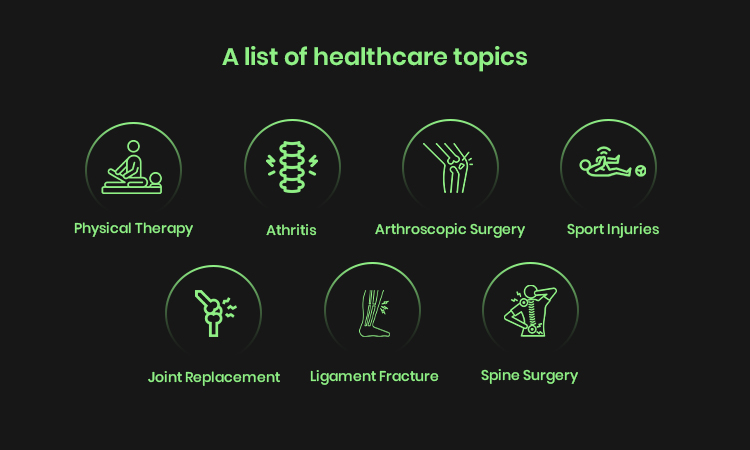
This is another crucial part of healthcare keyword research. You need to create a list of broad healthcare topics especially related to your service niche. The topics may be related to the healthcare products and services you offer or anything you believe your target audience would be interested in.
A study has shown that during July–December 2022, 58.5 of US adults use the internet to search for healthcare information. Thus, you must cover all the topics that are related to your healthcare expertise and attract all the prospects who seek that information or may need the same in the future. You can start with general healthcare topics related to your business. This will also help you identify those medical keywords related to your practice.
For example, you provide orthopedic treatment services. Then you can choose broad topics like:
- Physical Therapy
- Joint Replacement
- Arthroscopic Surgery
- Ligament Fracture
- Athritis
- Sport Injuries
- Spine Surgery
3. Expand the Topics in the List of Phrases
Now it’s time for you to expand these topics into a list of related phrases that you want to target through your healthcare content. You need to make a list of these phrases that can perfectly complement your content. Imagine yourself as someone who wants to seek gynecology treatments for certain health conditions. Ask yourself what you would type into Google if you want to search for gynecology treatments online.
We know that keyword tools are there for your help. They offer multiple features and benefits to find the right keywords for your business. But have you ever wondered if you can make a list of related phrases with this practice free of cost, by Googling your keywords? You can check whether your keywords match the most-searched phrases online. It is a beneficial healthcare SEO keyword strategy that will help you understand where to start your research.
For instance, Google ‘pediatrician’ or ‘pediatrics’ and you will get to see a list of related search queries that people mostly ask related to your searched keyword. You can list them and answer those queries through your website content (e.g., blog posts). It will help you rank your content higher on search engine results.
4. Find Healthcare SEO Keywords
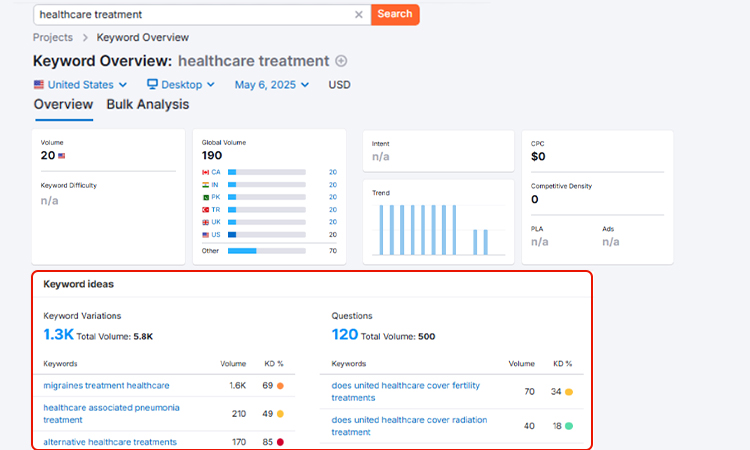
Now that you have successfully completed your preparation, you can start your medical keyword research. You can seek professional healthcare website design services to develop a website for your practice. But before that, you need to find out the most relevant keywords for your website and decide where to incorporate them.
A strategic approach must be followed for keyword placement as it will be of no use if you place your keywords anywhere in your content. Follow the steps below to begin your keyword research journey.
4 Tips to Begin Your Healthcare Keyword Research
- You can start with simple healthcare phrases like ‘best healthcare treatments’, ‘doctor near me’, ‘top hospitals (city name)’, ‘health and wellness’, and ‘healthcare remedies’.
- You can use tools like Google Keyword Planner or SEMrush to find keywords with higher search volume and lower competition. You’ll get to learn more about these tools below.
- Your competitor healthcare practices also use certain keywords in their website content. You need to identify them and analyze those keywords.
- Google’s ‘related searches’ or ‘people also ask’ section can help you find the most-searched keywords related to your healthcare niche.
5 Types of Healthcare Keywords for Your Practice
Short-Tail Keywords
These keywords contain one or two words and may not help you rank your website content higher as they are difficult to rank for because of their generic meaning. Keywords like ‘hospital’, ‘surgery’, ‘doctor’, or ‘cardiologist’ are general terms with broad intent. You can use them for initial broad visibility of your healthcare practice but they may not attract highly qualified medical leads.
Long-Tail Keywords
A healthcare keyword strategy requires you to find long-tail keywords for your practice as these phrases are specific and easy to rank on search results. These keywords can rank your specific webpages and drive traffic. Some examples of long-tail medical keywords are ‘heart surgery cost’, ‘diabetes treatment options’, ‘home remedies for joint pain’, and ‘emergency medical service near me’.
Location-based Keywords
These location-specific keywords can help you target the patient group of a specific location. It can help patients find dental care service providers in their geographic area.
For example, you provide dental care services in Noida and want to attract the local patients. You can use keywords like ‘best dental care near me’, ‘affordable dental services in Noida’, ‘root canal service near my location’, or ‘best orthodontics nearby’.
Brand Keywords
This refers to the brand name of your healthcare practice. For example, it can be the name of your hospital, clinic, or even a medical service provider’s name. Imagine that a local patient who already knows about your healthcare practice and dermatology clinic searches for it online by the name itself. Your website content will rank higher for these search queries if you incorporate your dermatology clinic’s name in the content. It is one of the best ways to attract qualified leads who are more likely to choose your treatment services.
Service-Specific Keywords
If you offer chiropractic treatment services, you can use chiropractic service-related keywords like ‘spinal manipulation’, ‘flexion distraction’, ‘ergonomic adjustments’, or ‘spinal decompression’. It will help those potential patients who need these specific chiropractic services. The patients can easily find the chiropractors who offer the specific services they need.
An impactful healthcare SEO keyword strategy requires you to target the following types of important medical keywords as well.
- Healthcare professionals can use medical condition-related keywords like ‘arthritis’, ‘heart disease’, ‘joint pain’, ‘diabetes’, or ‘high blood pressure’.
- They can incorporate accessibility keywords to help patients who search for medical care providers that offer certain accessibility facilities for patients. Some examples of accessibility keywords are ‘wheelchair accessible’ or ‘bilingual services’.
- Telehealth keywords like ‘online dental care consultation’ can help potential patients who seek virtual medical consultation services.
4 Major Tools You Can Use to Research High-Intent Healthcare Keywords
Your healthcare keyword research can be seamless with the use of the right tools. There are numerous paid and free keyword research tools that you may choose for your specific requirements. SEMrush, Ahrefs, Google Keyword Planner, and Google Search Console are some major tools that healthcare professionals can use to find beneficial terms and phrases for their practice. Additionally, healthcare providers can use Google Analytics to collect their data related to their website traffic, user behavior, and more.
You can type the primary or focus keyword related to your healthcare niche and the tools will show you the other related terms. Confused about which tool to choose for your practice? We’ve explained some major attributes of the most popular keyword research tools here. Check out and choose what suits your requirements the best.
SEMrush
It is one of the most popular tools that healthcare marketers can use to conduct keyword research. SEMrush is a powerful tool that offers a unique feature named Keyword Magic Tool. It provides an extensive list of related keywords grouped by topics and helps you to build a comprehensive medical keyword strategy.
The total number of keywords in the Magic Tool has now exceeded 26.6 billion. It helps you to perform competitive analysis, track traffic data and latest trends. You can identify keyword gaps in your competitors’ strategies with this tool’s competitive analysis features. All these features make SEMrush a top choice for healthcare marketers for their keyword research.
Google Keyword Planner
Google offers this free tool that you can use to find keywords related to your medical practice and services. It also helps you to check the estimates on the search volume for your selected keywords. It is one of the most beneficial keyword research tools as it directly draws from Google’s own search data insights.
Healthcare professionals can effortlessly identify the Google search patterns of their potential patients regarding their healthcare requirements. Another outstanding feature is its location filter. Want to establish a reputable local presence for your healthcare practice? We suggest you use this location filter to target specific locations and cities to get hyper-local search volume estimates.
Ahrefs
This keyword explorer is a comprehensive SEO tool where you can get access to extensive keyword data like keyword search volume, potential to drive traffic, and keyword difficulty. What sets Ahrefs apart from the other popular keyword research tools? It’s the ability to offer detailed competitive analysis. You can see the list of keywords your competitors use to rank their content.
This tool also offers you keyword suggestions based on the performance of those keywords used by your competitors. It uncovers countless keyword opportunities to outrank your competitor’s content in the related search engine results.
Google Search Console
It is not a traditional tool for keyword research, yet you can use this to find striking distance keywords that can improve your healthcare content’s search rankings. Google Search Console offers you a data insight into the keywords that have ranked your medical practice on Google and the number of clicks and impressions each of those keywords receives.
It can help healthcare professionals identify those low-ranking keywords that don’t have the potential to drive meaningful traffic to your website. You can optimize existing and new content accordingly to achieve your desired ranking. Google Search Console also helps you find your niche long-tail keywords that other traditional SEO tools may overlook.
5. Analyze the Healthcare SEO Keywords
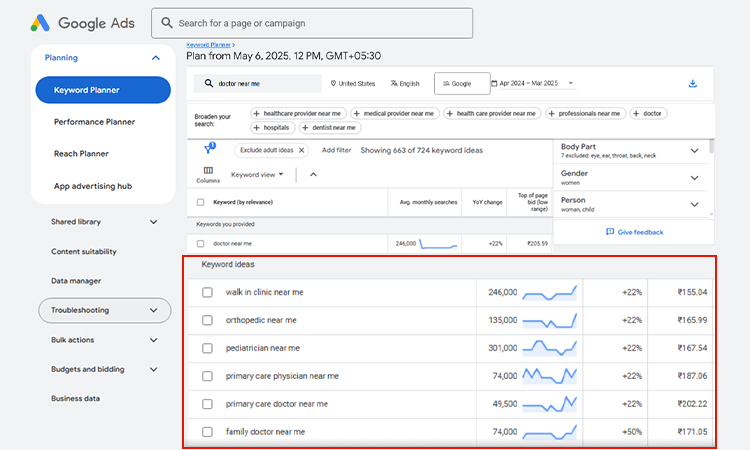
Once you have the list of your potential medical keywords, you need to analyze them and choose the one that you will target through your content.. Choose the right keyword research tool and track the following metrics:
- Search Volume
- Cost Per Click
- Keyword Trends
- Search Value over time
- Keyword Difficulty
- Search Engine Results Page Features
- Keyword Relevancy and Search Intent
How to Check the Relevancy of Your Potential Keywords?
For this, you need to check whether the keywords you have chosen with the help of keyword research tools match your healthcare expertise, niche, and services. You can ask yourself the following questions.
- Are these phrases relevant to your healthcare business?
- Do these keywords have the potential to rank your healthcare content on search results?
- If these keywords rank your practice online, does your healthcare business achieve a good return on investment (ROI)?
If all the answers to these questions are YES, you can consider that you have chosen the right keywords for your practice.
4 Major Types of Your Potential Patient’s Search Intent
It refers to the goal and purpose of a Google search query. For example, when a patient has searched for some treatment online, they either want to book an appointment for the same treatment or seek more information regarding the same. Additionally, they may want to find those providers who provide that specific treatment service or research about that before they decide to undergo the treatment.
For instance, you want your website to rank for ‘Blood Pressure Management guide’, but your website doesn’t contain the guide. You may fail to meet the searcher’s intent and rank your content higher on SERPs. Explore the four most significant types of search intent that will help you choose effective medical keywords for your business.
Informational Intent
Patients often search online for authentic information related to healthcare. It is an informational search intent and these patients mostly use words like ‘how’, ‘why’, ‘what’ and ‘when’ when they search for any medical information online.
Navigational Intent
The next one is the navigational search intent of patients. How can you identify the intent? These patients mostly try to find a specific healthcare website or use words related to a specific treatment service, product, or healthcare business. They tend to use keywords like ‘(clinic name) business hours’, ‘(website name) login’, or ‘(hospital name) customer service number.
Transactional Intent
Patients who want to book an appointment for a healthcare consultation or a treatment have transactional search intent. They mostly use keywords like ‘cost of (treatment name)’, ‘affordable treatment services’, or ‘schedule appointment for (treatment name)’.
Commercial Investigation
Patients who want to seek a specific treatment service often search online for various factors about that treatment. They often search for the costs and reviews before they decide to undergo a treatment. Additionally, they can compare the treatment services from different providers and choose what best suits their medical requirements. These patients often use words like ‘comparison’, ‘cost’, ‘pricing’, or ‘reviews’.
6. Conduct Local Keyword Research to Rank for Local Searches
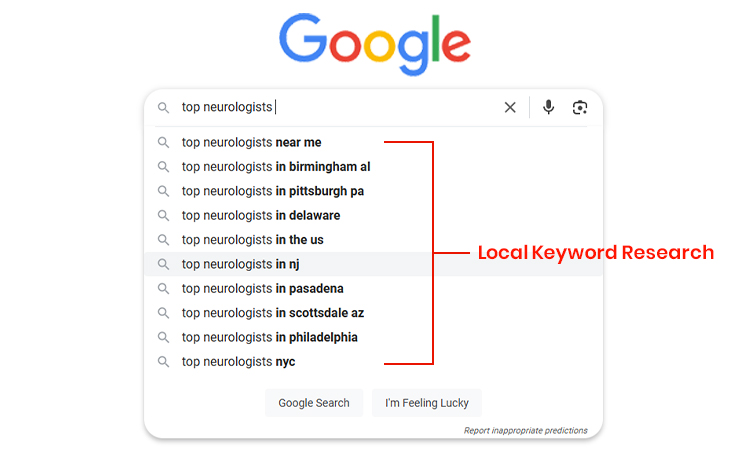
An effective healthcare SEO keyword strategy will be incomplete without the local SEO optimization of your practice. Are you among those healthcare providers who overlook local keyword research and optimization? If yes, then you may be losing a significant number of your potential patients in your service location. We understand that you provide top-notch healthcare services, but you still need to optimize your website with local medical keywords to make it rank for local search results.
Do you know that 46% of Google searches have local intent. Thus, local healthcare providers must search relevant location-specific keywords for your healthcare content and optimize it accordingly. Let’s know how you can find local keywords.
Tips to Find Location-specific Keywords for Your Healthcare Content
Choose Keywords Specific to your Niche
You need to search for local keywords that are specifically related to your healthcare niche. The keywords can be those common words and phrases that the local prospects mostly use for their online research. Sounds complex? You can ask yourself what you would type into Google to search for specific nearby healthcare services.
Effectively Use Keyword Modifiers
Healthcare professionals can use keyword modifiers to describe the quality or type of local treatment services, providers, or organizations. They can use terms like ‘best’, ‘top’, ‘affordable’, or ‘free’ to change their search intent behind the local keywords and significantly improve the click-through rates. Some examples are ‘best dental care service near me’ or ‘affordable med spa in my city’.
Select Location-Specific Keywords
Patients often search for treatment services in their nearby area because of transportation and emergency care facilities. Thus you must choose keywords that highlight the location where you provide treatment services. For example, you can select keywords like ‘top oncology services near me’, ‘affordable pathology services near my location’, or ‘reliable health insurance provider in town’. You need to use these local keywords in your website service pages, blog posts, and social media pages.
Use Google Autocomplete and Track Your Competitors
You can enter your primary local keyword in Google and list the suggested search queries it generates. It will help you identify the other related local keywords that people mostly search for. Additionally, you can check which local keywords your competitors use in their content to rank their practice online.
7. Analyze Healthcare SEO Competitor Keywords
It is essential for healthcare providers to research their competitors’ healthcare SEO keyword strategy. They must analyze the keywords their competitors use in the website content, which you don’t. You can also examine which of their keywords have performed well and which have not delivered the desired outcome. This practice will help you find missed opportunities and choose new medical keywords to target through your website content.
This analysis will help you understand how top-ranking healthcare websites perform in terms of SEO. The following are some factors that you will learn from your healthcare keyword competitor analysis.
- You’ll get to learn what works and what doesn’t in your healthcare keyword strategy.
- You can identify your competitor’s weaknesses and make those factors your strength.
- You can also identify the USPs of your competitor’s keyword strategy and try to implement them on your website to maximize the impact.
- You’ll get a clear idea of the keyword tasks that you must prioritize to excel in SEO for healthcare.
- Furthermore, you’ll understand how difficult it will be to outperform your competitors in the SERP results.
Your healthcare website may rank higher in search results, still you must prioritize this competitor analysis to track what SEO strategies your competing website has implemented. You can stay competitive and find new, meaningful SEO opportunities that you may have missed.
Key Steps to Perform a Competitor Keyword Analysis
Step 1: You need to gather the URLs of your competing healthcare websites to perform the analysis. You must have a pretty good idea of your competitors, right? If not, conduct research and learn more about who your competitors are. You can use keyword research tools that offer you the facility to analyze your competing sites.
Step 2: Firstly, you must create a list of keywords that you don’t want to target. It will make your data more accurate and useful for future implementation. You need to remove certain keywords for some specific reasons as it can hamper the search engine rankings. It will save your time and resources that you may invest in ranking for those unimportant keywords.
Step 3: You can now get the organic keyword report for your domain with the help of keyword research tools like Ahrefs. You need to export the top 1000 organic rankings and repeat the same process for your competitor’s domain. It will also allow you to apply certain filters before you export the data.
Step 4: Create a spreadsheet of your and your competitor’s rankings. You need to incorporate your competitor’s keyword data in the spreadsheet. It’s necessary to put all the medical keyword data together in the sheet to find the keyword gaps. You can label each of the tabs so that you can easily keep track.
Step 5: It’s time to find the gaps in your healthcare SEO keyword strategy. You can now find out those keywords that your competing sites have ranked for but your website has not. You can highlight these keywords in the sheet.
8. Appropriately Use These Keywords in Your Healthcare Content
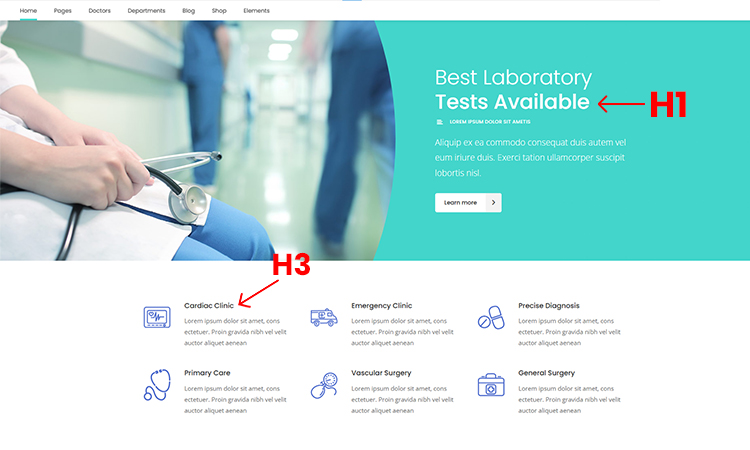
Keyword research and analysis are not enough for healthcare professionals. You must know how to strategically place those keywords in your content for maximum effectiveness. We have mentioned certain useful tips for keyword placement. Let’s have a look.
How to Strategically Place Keywords in Your Content?
- It is mandatory to use the primary keyword in the page title. For example, you need to add the primary keyword ‘best dental care service in Noida’ in the title of your hospital’s dental care service page.
- You need to add the primary keywords in the header tags, such as in the H1, H2, and H3 tags.
- Additionally, the placement of the main keyword in the meta title and meta description is essential for SEO rankings.
- According to SEO specialists, adding the primary keywords in the first 100 words of your content can rank it higher on relevant search results.
- Have you forgotten the images that you added to your healthcare content? You cannot ignore the visual element of your content as it significantly enhances the credibility and impact of your content. You can include the focus keywords in the alt text descriptions of your images.
- Even the site and page URLs must consist of relevant keywords. For example, the page URL of your orthopedic blog post can be ‘xyzorthocarespecialty/orthopedic treatment for arthritis’.
- You should always avoid keyword stuffing as it can decrease your web page SEO ranking. It is not enough to incorporate the medical keywords in the mentioned places. You need to naturally add those phrases to the content. The keyword placement must not look forced and should always maintain a flow.
- Your Google Business Profile (GBP) represents your healthcare practice to potential patients and helps them locate your practice. You need to incorporate the primary keywords in your GBP description and the ad copy of your PPC advertisements to make them more relevant to potential patients’ search queries.
- Do you have a clear idea of keyword density? If not, let us make it easy for you. It refers to the amount or number of times you need to incorporate keywords in your content. An appropriate keyword density prevents keyword stuffing. You need to use the main keyword 1-2 times per 100 words to maintain a natural flow. Then the density will be 1-2%. Usage of focus keywords more than the mentioned density can make it difficult for search engine algorithms to rank your healthcare website on their first page of search results.
Top 20 SEO Keywords for Healthcare
Below we have provided you with a list of the most popular keywords related to the healthcare industry. We have also highlighted these keywords’ monthly search volume. If you want to rank your healthcare practice on relevant search engine results, these keywords can be immensely helpful for your content ideas and boost your healthcare SEO keyword strategy.
| Keywords | Volume | Difficulty |
| Healthcare Solutions | 9,900 | Low |
| Best Health Center Near Me | 20 | Low |
| Top Health Center | 90 | Low |
| Health Care Center | 5,400 | Low |
| Best Healthcare Services | 90 | Medium |
| Healthcare Services | 6,600 | Low |
| Healthcare Services Near Me | 480 | Low |
| Affordable Healthcare Services | 30 | Low |
| Private Healthcare Near Me | 110 | Low |
| Healthcare | 135,000 | Low |
| Private Healthcare | 2,900 | Medium |
| Healthcare Plans | 6,600 | Medium |
| Medical | 301,000 | Low |
| Medical Center | 135,000 | Low |
| Medical Solutions | 27,100 | Low |
| Medical Center Near Me | 40,500 | Low |
| Healthcare Center Near Me | 1,900 | Low |
| Affordable Health Clinic Near Me | 880 | Medium |
| Local Health Clinic | 320 | Low |
| Best Private Healthcare | 40 | Medium |
Conclusion
Keyword research plays a crucial role in healthcare search engine optimization. It can completely transform a healthcare business’s online presence and visibility. You cannot ignore this practice if you want to establish a robust search engine presence and grow your online patient base. But just like any other SEO practice (e.g., on-page SEO, off-page SEO, and technical SEO), keyword research also requires you to implement effective strategies to ensure its effectiveness.
Our complete guide to healthcare keyword research will help you perform the practice in the most effective way. Unless you have a clear idea of it, you cannot achieve your desired outcome. Once you know about the secret of impactful healthcare keyword research, you can create content that perfectly aligns with your target audience’s requirements. Healthcare SEO keyword strategy will also help you build an effective content marketing strategy to attract patients.
Additional Resouces:



























